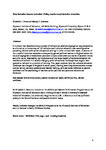How inclusion became exclusion: Policy, teachers and inclusive education
| dc.contributor.author | Done, Elizabeth | |
| dc.contributor.author | Andrews, Mandy | |
| dc.date.accessioned | 2018-11-14T10:33:21Z | |
| dc.date.issued | 2019-03-20 | |
| dc.identifier.issn | 0268-0939 | |
| dc.identifier.issn | 1464-5106 | |
| dc.identifier.uri | http://hdl.handle.net/10026.1/12781 | |
| dc.description.abstract |
It is almost two decades since a concept of inclusion as selective segregation was proposed as an alternative to the concept of full inclusion and inclusive education was reconfigured as providing children with varied educational settings in order to meet their needs. A version of this model of inclusive education subsequently gained political traction in England where the issue of segregated or mainstream provision is now constructed as a matter of parental choice and child voice. Meanwhile, the implications of this latest model of inclusive education for teachers and schools in a rapidly changing wider educational landscape have largely been ignored or reduced to a question of training. This paper explores how the inclusive education landscape has changed in England in recent years, charting recent key developments in areas such as policy, statutory guidance and teacher training, with particular reference to teacher workload and the positioning of teachers within political and polemical educational discourse. | |
| dc.format.extent | 447-464 | |
| dc.language | en | |
| dc.language.iso | en | |
| dc.publisher | Taylor & Francis (Routledge) | |
| dc.subject | Inclusive education | |
| dc.subject | Performativity | |
| dc.subject | Special educational needs | |
| dc.subject | Teacher workload | |
| dc.title | How inclusion became exclusion: Policy, teachers and inclusive education | |
| dc.type | journal-article | |
| dc.type | Journal Article | |
| plymouth.author-url | https://www.webofscience.com/api/gateway?GWVersion=2&SrcApp=PARTNER_APP&SrcAuth=LinksAMR&KeyUT=WOS:000463248000001&DestLinkType=FullRecord&DestApp=ALL_WOS&UsrCustomerID=11bb513d99f797142bcfeffcc58ea008 | |
| plymouth.issue | 4 | |
| plymouth.volume | 35 | |
| plymouth.publication-status | Published | |
| plymouth.journal | Journal of Education Policy | |
| dc.identifier.doi | 10.1080/02680939.2018.1552763 | |
| plymouth.organisational-group | /Plymouth | |
| plymouth.organisational-group | /Plymouth/Faculty of Arts, Humanities and Business | |
| plymouth.organisational-group | /Plymouth/Faculty of Arts, Humanities and Business/Plymouth Institute of Education | |
| plymouth.organisational-group | /Plymouth/REF 2021 Researchers by UoA | |
| plymouth.organisational-group | /Plymouth/REF 2021 Researchers by UoA/UoA23 Education | |
| plymouth.organisational-group | /Plymouth/Users by role | |
| plymouth.organisational-group | /Plymouth/Users by role/Academics | |
| dcterms.dateAccepted | 2018-11-20 | |
| dc.rights.embargodate | 2020-9-19 | |
| dc.identifier.eissn | 1464-5106 | |
| dc.rights.embargoperiod | Not known | |
| rioxxterms.versionofrecord | 10.1080/02680939.2018.1552763 | |
| rioxxterms.licenseref.uri | http://www.rioxx.net/licenses/all-rights-reserved | |
| rioxxterms.licenseref.startdate | 2019-03-20 | |
| rioxxterms.type | Journal Article/Review |


